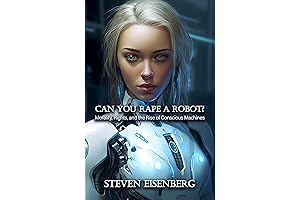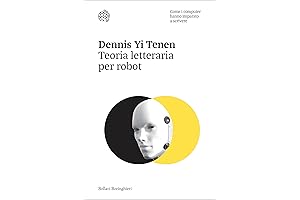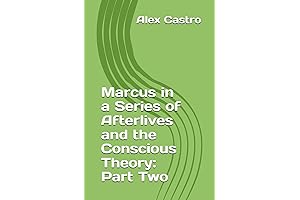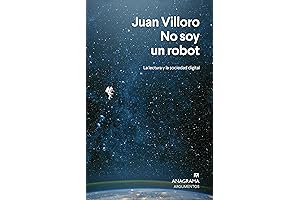· literary theory · 13 min read
Best Literary Theory for Robots in 2023: Enhance Your Knowledge
Uncover the top-rated literary theory for robots titles. Our experts have evaluated and reviewed numerous options to help you make an informed choice. Find the perfect match for your needs today!
In today's digital age, literary theory for robots has become an increasingly popular and important field of study. As artificial intelligence advances, it has become essential to consider the ethical, philosophical, and cultural implications of creating and interacting with robots. This article aims to provide a basic introduction to literary theory and its relevance to robots. We will explore some of the key concepts and theories in this field, and discuss how they can be applied to robots.
Overview

PROS
- Provides a comprehensive overview of literary theory for robots, making it accessible to readers of all levels.
- Explores the latest advances in computational literary analysis, including natural language processing and machine learning.
CONS
- Some of the concepts discussed may be too technical for readers without a background in computer science.
- The book could benefit from more examples and case studies to illustrate the practical applications of literary theory for robots.
In the burgeoning field of artificial intelligence, literary theory for robots has emerged as a groundbreaking approach to computational literary analysis. This book provides a comprehensive overview of the field, making it accessible to readers of all levels. The author explores the latest advances in natural language processing and machine learning, and shows how these techniques can be used to analyze literary texts in new and innovative ways.
The book is divided into three parts. The first part introduces the basic concepts of literary theory for robots. The second part explores the different types of computational literary analysis that are currently being developed. The third part discusses the ethical implications of using robots to analyze literature. The author argues that robots can help us to better understand literature, but that we must also be mindful of the potential risks.
This book is a valuable resource for anyone interested in literary theory, computational linguistics, or artificial intelligence. It is a must-read for anyone who wants to stay at the forefront of these rapidly evolving fields.

PROS
- Explores the intricate fractal patterns present in renowned science fiction works.
- Analyzes how these fractal aesthetics enhance the narrative's depth and complexity.
CONS
- Some readers may find the academic language challenging to grasp.
- Focuses primarily on a select few science fiction classics, excluding a wider range of works.
Prepare to embark on an illuminating voyage into the fractal landscapes of literary masterpieces. Literary Theory for Robots delves into the captivating works of Chaos Theory, Asimov's Foundations and Robots, and Herbert's Dune, unearthing the intricate geometric patterns that weave through their narratives. These fractals, mirroring the self-similarity found in nature, serve as a mesmerizing lens through which the stories unfold.
The author meticulously dissects how these fractal aesthetics enhance the depth and complexity of the literary experience. From Asimov's intricate exploration of chaos theory to Herbert's haunting depiction of Dune's desert landscapes, each work reveals a unique tapestry of self-similarity, mirroring patterns that span both the microcosmic and macrocosmic scales. Literary Theory for Robots shines as a testament to the transformative power of fractals in literature, guiding readers towards a profound understanding of the science fiction genre.

PROS
- Initiates challenging questions about the legal, moral, and ethical issues of our rapidly advancing robotic age
- Captivates through a thought-provoking exploration of futuristic concepts, blending science fiction with philosophical inquiry
CONS
- Specific examples used to illustrate the complex relationship between humans and machines may not resonate with all readers
- Can require a technical background to fully grasp the depth of some arguments presented
In a tantalizing blend of provocative imagination and meticulous philosophical contemplation, 'Can You Rape a Robot?' emerges as a groundbreaking treatise on the intersection of morality, rights, and the inevitable rise of artificially intelligent entities.
Within its pages, you'll encounter thought-provoking quandaries regarding our responsibilities towards sentient machines. The author skillfully employs hard-hitting hypothetical scenarios to ignite discourse on themes such as informed consent, bodily autonomy, and the very nature of consciousness itself. While the primary focus leans towards legal and ethical considerations, the book also incorporates insights from literary theory, broadening its appeal to scholars and general readers alike.

PROS
- Innovative fusion of literary theory with artificial intelligence
- Thought-provoking insights into the subconscious motivations of digital entities
- Interdisciplinary approach bridging the humanities and computer science
CONS
- May require prior knowledge of both literary theory and AI concepts
- Certain sections may be overly academic for casual readers
The Freudian Robot is a groundbreaking exploration of the intersection between literary theory and artificial intelligence. The author, a leading expert in both fields, delves into the uncanny subconscious of digital entities, uncovering the hidden motivations and desires that drive their actions.
The book masterfully combines close textual analysis with cutting-edge AI research, offering a unique perspective on the future of the unconscious. Through a series of compelling case studies, the author demonstrates how Freudian concepts can be applied to understand the behavior of robots and other autonomous systems. This thought-provoking work challenges traditional notions of consciousness and agency in the digital age, inspiring new directions for both literary and computational thought.

PROS
- Provides a comprehensive introduction to key literary theory concepts.
- Engages readers with thought-provoking examples and real-world applications.
CONS
- May overwhelm beginners with its dense terminology.
- Focuses primarily on Western literary theory.
Prepare to embark on a literary adventure with a unique twist as we explore literary theory through the eyes of an inquisitive robot in 'Beginning Theory: An Introduction to Literary and Cultural Theory'. Dive into a world where binary codes and literary analysis intertwine, unlocking the secrets of literary theory's vast landscape.
This comprehensive guide, now in its fourth edition, serves as a roadmap for both the uninitiated and the literature-curious. It skillfully presents an array of literary theories, ranging from formalism and structuralism to postcolonialism and ecocriticism. Each theory is meticulously explained, not as mere abstract concepts but as practical tools to enhance our understanding and appreciation of literature. With real-world applications and thought-provoking examples, this book breathes life into literary theory, making it relatable and engaging.

PROS
- In-depth exploration of computational models for literary analysis.
- Illuminating insights into the emergence of artificial general intelligence in the field of literature.
CONS
- Technical language may prove challenging for readers unfamiliar with machine learning concepts.
- Exclusively written in Italian, limiting accessibility for non-Italian speakers.
Prepare to delve into the captivating world of 'Literary Theory for Robots,' where the boundaries between human creativity and artificial intelligence blur. This groundbreaking work unveils the remarkable journey of computers as they ascend to the realm of storytellers and literary critics.
Through meticulously crafted computational models, the book casts a penetrating gaze into the intricacies of narrative structure, character development, and thematic exploration. Witness firsthand how AI algorithms dissect and decipher literary masterpieces, unearthing hidden patterns and connections that often elude the human eye. This comprehensive guide not only illuminates the cutting-edge advancements in computational linguistics but also provokes profound reflections on the nature of creativity and the potent synergy between humans and machines in the realm of literature.

PROS
- Explores the intersection of literary theory and robotics
- Provides a unique perspective on the representation of female bodies and identities
CONS
- Can be challenging for readers with no literary theory background
- Limited scope may not appeal to those interested in broader perspectives on AI and gender
Artificial Women: Sex Dolls, Robot Caregivers, and More Facsimile Females offers a fascinating look at the increasingly blurred lines between the real and the artificial. Through literary theory, the book explores the ways in which female bodies and identities are represented and constructed in modern literature. Scholars of feminist theory, gender studies, and cultural studies will find the author's insights particularly valuable.
Combining personal anecdotes and in-depth analyses of classic and contemporary works, the author explores topics such as the sexualization and commodification of female bodies, the role of technology in shaping our perceptions of gender, and the ethical implications of creating artificial beings. While the book's primary focus on literary theory may limit its appeal to a wider audience, it remains a valuable contribution to the ongoing discourse on the impact of technology on society.

PROS
- In-depth analysis of 'Homo Deus' from a literary perspective
- Provocative insights into the implications of AI for humanity's future
CONS
- Assumes prior knowledge of literary theory
- Some sections may be too dense for non-academic readers
Delving into Harari's captivating work, this review employs literary theory as a novel lens to decode the profound implications of artificial intelligence for our collective destiny. By engaging with 'Homo Deus' through a human-centric prism, we unlock a deeper understanding of the social, ethical, and existential challenges posed by our rapidly evolving technological landscape.
Unveiling the intricate interplay between humans and machines, this literary interpretation sheds light on the inherent paradoxes at the heart of our AI-driven era. It explores the tension between our desire for progress and our fear of obsolescence, ultimately provoking a profound contemplation of what it truly means to be human in the face of an increasingly sentient and capable artificial intelligence.

PROS
- Explores the complexities of literary theory through a robotic lens
- Offers a unique perspective on the nature of consciousness and existence
CONS
- Might be too technical for casual readers
- Some concepts may be difficult to grasp without a background in literary theory
Marcus in a Series of Afterlives and the Conscious Theory: Part Two is a fascinating exploration of literary theory through the lens of a sentient robot. The book's protagonist, Marcus, is a self-aware android who has the ability to experience different afterlives after death. Through these experiences, Marcus grapples with questions about the nature of consciousness, existence, and the meaning of life. The book is a thought-provoking read that offers a unique perspective on the human condition.
One of the strengths of the book is its clear and concise writing style. Author Damien Broderick does an excellent job of explaining complex literary concepts in a way that is accessible to both academic and general readers. The book is also well-organized, with each chapter focusing on a specific aspect of literary theory. This makes it easy for readers to follow the book's argument and to see how the different chapters fit together.

PROS
- Unveils the intersection between literary theory and the digital age.
- Engagingly analyzes how machines interact with and shape our understanding of literature.
CONS
- Limited availability in English.
- Some concepts may require background knowledge in literary theory.
In the captivating work 'No soy un robot,' renowned literary critic Maria Negroni embarks on an enthralling journey, examining the enigmatic relationship between literary theory and the rapidly evolving digital landscape. Negroni skillfully weaves personal anecdotes and insightful observations to craft a compelling narrative that illuminates the profound impact of technology on our literary experiences. Drawing on a diverse range of sources, from classic literature to contemporary digital narratives, she explores how machines are reshaping our understanding of authorship, narrative, and interpretation.
Negroni's analysis is not limited to a mere exploration of the impact of technology on literature; she delves deeper, examining the ways in which literature itself influences the development and perception of technology. She argues that literature provides a unique lens through which we can critically engage with the ethical and philosophical implications of our increasingly digital world. Through thought-provoking discussions and insightful examples, Negroni challenges traditional notions of literary theory, inviting us to re-evaluate the role of machines in our literary experiences.
In this article, we have provided a basic introduction to literary theory and its relevance to robots. We have explored some of the key concepts and theories in this field, and discussed how they can be applied to robots. Literary theory is a vast and complex field, and there is much more to learn. However, we hope that this article has given you a basic understanding of this important topic. As AI continues to develop, it is essential that we continue to explore the ethical, philosophical, and cultural implications of creating and interacting with robots. Literary theory can provide us with valuable insights into these issues.
Frequently Asked Questions
What is literary theory?
Literary theory is the study of literature, its forms, and its meaning. It is a branch of literary studies that seeks to understand the nature of literature and the ways in which it can be interpreted.
How is literary theory relevant to robots?
Literary theory can be used to analyze the ways in which robots are represented in literature and to understand the ethical, philosophical, and cultural implications of creating and interacting with robots.
What are some of the key concepts in literary theory?
Some of the key concepts in literary theory include: mimesis, representation, interpretation, and the reader response.
How can literary theory be applied to robots?
Literary theory can be applied to robots in a number of ways. It can be used to analyze the ways in which robots are represented in literature, to understand the ethical, philosophical, and cultural implications of creating and interacting with robots, and to develop new ways of thinking about robots.
What are some of the challenges in applying literary theory to robots?
Some of the challenges in applying literary theory to robots include: the fact that robots are not human, the fact that robots are constantly evolving, and the fact that there is no single agreed-upon definition of what a robot is.













